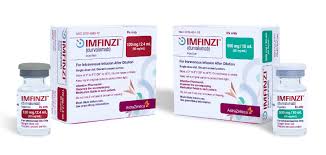
AstraZeneca’s immuno-oncology combination of Imfinzi and tremelimumab has failed to improve overall survival in a phase 3 trial, further undermining hopes of a challenge to Merck & Co’s Keytruda in first-line non-small cell lung cancer (NSCLC).
The NEPTUNE study compared PD-L1 inhibitor Imfinzi (durvalumab) and AZs experimental CTLA4 inhibitor tremelimumab to standard platinum-based chemotherapy in previously-untreated patients with advanced NSCLC.
The same combination failed to move the needle in the MYSTIC trial, but signs of an improvement in a subgroup of patients with a particular cancer biomarker – high tumour mutational burden (TMB) – prompted AZ to tweak the design of NEPTUNE to focus specifically on those patients.
The top-line results are now in, and it’s a major disappointment for AZ as the high TMB group – defined as those with 20 or more mutations per megabase – showed no improvement in OS compared to chemotherapy.
In a statement, AZ’s head of cancer R&D José Baselga said only that the company is “fully committed to a deep analysis of the vast clinical and biomarker data from this trial to gain further insights to improve immuno-oncology approaches for patients with metastatic non-small cell lung cancer.”
The readout will also be a concern to Bristol-Myers Squibb, which is relying on TMB data to make a case for its PD-1 inhibitor Opdivo (nivolumab) after the drug also failed comprehensively in first-line NSCLC.
BMS is testing the FDA’s view on this with an application for Opdivo plus its CTLA4 inhibitor Yervoy (ipilimumab) in first-line patients with TMB above 10 mutations per megabase, with a verdict due by next year.
The trial effectively ends AZ’s main challenge to Keytruda (pembrolizumab) as the dominant cancer immunotherapy for first-line NSCLC, although the company has successfully carved out a niche for Imfinzi as a maintenance therapy for locally-advanced NSCLC patients whose tumours cannot be removed surgically.
The PD-L1 inhibitor was approved for this use on the back of the PACIFIC trial, and it is behind an acceleration in Imfinzi sales which rose 244% to $633m in the first half of this year.
AZ has another combination trial of Imfinzi and tremelimumab on the go in first-line NSCLC – called POSEIDON – which is also due to read out before the end of the year, although hopes of a positive outcome from that study now look slim.
POSEIDON is comparing triple therapy with Imfinzi, tremelimumab and chemotherapy to Imfinzi plus chemotherapy as well as chemotherapy alone. Meanwhile, the PEARL trial is pitting Imfinzi against chemotherapy in first-line NSCLC.




